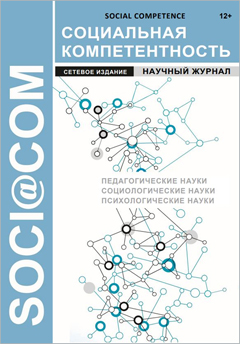Criteria for assessing the skills of information-safe behavior of adolescents
DOI:
https://doi.org/10.24866/2658-5855/2023-4/26-34Keywords:
information security, teenagers, technology, diagnostics, information security criteriaAbstract
The purpose of the article is to consider the relevance of the formation of skills of information-safe behavior of adolescents as behavior that ensures their safety in organizing the search, collection, processing, analysis and codification, use and storage of information using various information sources that do not harm others. The author solves one of the research tasks related to the description of technology for the formation of skills of information-safe behavior of adolescents in an educational organization, involving the implementation of several stages, each of which is associated with the formation of components of information-safe behavior of a teenager: the stage of actualization and familiarization – with the formation of a value-motivational component in relation to information security; the stage of understanding and transformation – with the formation of the cognitive component; the stage of application and acceptance – with the formation of the activity component; the stage of analysis and synthesis involves the formation of an analytical component; the reflexive stage involves the formation of a creative component. The effectiveness of the implementation of the stages of technology for the formation of information-safe behavior skills of adolescents is presented based on the goals of its implementation, according to knowledge (cognitive), motivational-activity, reflexive criteria.
Downloads
References
Семухин С.Д. Нормативно-правовая база информационной безопасности детей, проблемы воздействия на ребёнка и пути решения // Правовое регулирование экономической деятельности. 2022. № 2. С. 35–41. Semukhin S.D. Regulatory and legal framework for information security of children, problems of impact on the child and solutions. Legal regulation of economic activity, 2022, no. 2, pp. 35–41. (In Russ.).
Полянина А.К. Дефекты правового обеспечения информационной безопасности детей // Актуальные проблемы гуманитарных и социально-экономических наук. 2022. Т. 3, № S(89). С. 16–18. Polyanina A.K. Defects in the legal provision of information security for children. Actual problems of humanitarian and socio-economic sciences, 2022, vol. 3, no. S(89), pp. 16–18. (In Russ.).
Полянина А.К. Технологии управления информационной безопасностью детей // Информационные технологии в экономике и управлении: сборник материалов V всероссийской научно-практической конференции. Махачкала, 2022. С. 80–81. Polyanina A.K. Technologies for managing information security for children. Information technologies in economics and management: collection of materials of the V All-Russian scientific and practical conference. Makhachkala, 2022. P. 80–81. (In Russ.).
Солдатова Г.У., Рассказова Е.И., Нестик Т.А. Цифровое поколение России: компетентность и безопасность. Москва: Смысл, 2017. 375 с. Soldatova G.U., Rasskazova E.I., Nestik T.A. The digital generation of Russia: competence and security. Moscow, Science Publ., 2017. 375 p. (In Russ.).
Тарасова А.В., Маскалянова С.А. Педагогические подходы к обеспечению информационной безопасности детей и подростков в сети Интернет // Психолого-социально-педагогический светофор информационной среды. сборник материалов межрегиональной научно-практической конференции. Липецк, 2022. С. 41–47. Tarasova A.V., Maskalyanova S.A. Pedagogical approaches to ensuring information security of children and adolescents on the Internet. Psychological, socio-pedagogical traffic light of the information environment: collection of materials of the interregional scientific and practical conference. Lipetsk, 2022, pp. 41–47. (In Russ.).
Долматова Ю.Ю., Тафинцева Л.М. Информационная безопасность и защита прав детей в Интернет-среде // Психолого-социально-педагогический светофор информационной среды. сборник материалов межрегиональной научно-практической конференции. Липецк, 2022. С. 21–26. Dolmatova Yu.Yu., Tafintseva L.M. Information security and protection of children's rights in the Internet environment. Psychological, socio-pedagogical traffic light of the information environment: collection of materials of the interregional scientific and practical conference. Lipetsk, 2022, pp. 21–26. (In Russ.).
Контылева Е.А., Сагалаев А.В. Информационная безопасность детей и подростков в сети интернет // Энергетические установки и технологии. 2023. Т. 9, № 1. С. 165–172. Kontyleva E.A., Sagalaev A.V. Information security of children and adolescents on the Internet. Power plants and technologies, 2023, vol. 9, no. 1, pp. 165–172. (In Russ.).
Загвязинский В. И. Методология и методика дидактического исследования. Москва: Педагогика, 1982. 165 с. Zagvyazinsky V.I. Methodology and methodology of didactic research. Moscow, Pedagogy Publ, 1982. 165 p. (In Russ.).
Ефимов В.Н. Информационно безопасное поведение подростков // Образование и общество. 2022. № 6(137). С. 126–133. Efimov V.N. Information-safe behavior of adolescents. Education and society, 2022, no. 6 (137), pp. 126–133. (In Russ.).
Галагузова Ю.Н., Ефимов В.Н. Технология формирования информационно безопасного поведения учащихся на уроках информатики // Челябинский гуманитарий. 2022. № 4(61). С. 31–36.Galaguzova Yu.N., Efimov V.N. Technology for the formation of information-safe behavior of students in computer science lessons. Chelyabinsk Humanities, 2022, no. 4(61), pp. 31–36. (In Russ.).
Астафьева О.Н., Захарова О.А. Информационно-коммуникативная компетентность личности в условиях становления информационного общества // Медиакультура новой России: методология, технология, практики. Екатеринбург; Москва: Академ. проект, 2007. С. 374–385. Astafyeva O. N., Zakharova O.A. Information and communication competence of a person in the conditions of the formation of an information society. Media Culture of the New Russia: methodology, technology, and practices. Yekaterinburg, Moscow, Academ. the project Publ., 2007, pp. 374–385. (In Russ.).
Дерендяева Н.С. Структура, критерии, уровни и показатели сформированности культуры информационной безопасности школьников // Наука и школа. 2016. № 5. С. 190–195. Derendyaeva N.S. Structure, criteria, levels and indicators of formation of culture of information security of schoolchildren. Science and school, 2016, no. 5, pp. 190–195. (In Russ.).
Борисова Т.В. Развитие информационной культуры младших школьников в пространстве воспитания: автореф. дис. ... канд. пед. наук: 13.00.01. Москва, 2014. 31 с. Borisova T.V. The development of information culture of younger schoolchildren in the space of education: abstract of PhD (Pedagogy) Thesis. Moscow, 2014. 31 p. (In Russ.).
Кларин М.В. Инновационные модели обучения в зарубежных педагогических поисках. Москва, 1994. 222 с. Klarin M.V. Innovative models of teaching in foreign pedagogical searches. Moscow, 1994. 222 p. (In Russ.).
Алтыникова Н.В., Ряписова А.Г. Оценивание сформированности рефлексивных умений студентов в образовательном процессе // Вестник педагогических инноваций. 2016. № 3(43). С. 5–20. Altynikova N.V., Ryapisova A.G. Assessment of the formation of students' reflexive skills in the educational process. Bulletin of pedagogical innovations, 2016, no. 3(43), pp. 5–20. (In Russ.).
Downloads
Published
Issue
Section
License
Copyright (c) 2023 Виталий Николаевич Ефимов

This work is licensed under a Creative Commons Attribution-NonCommercial-NoDerivatives 4.0 International License.


